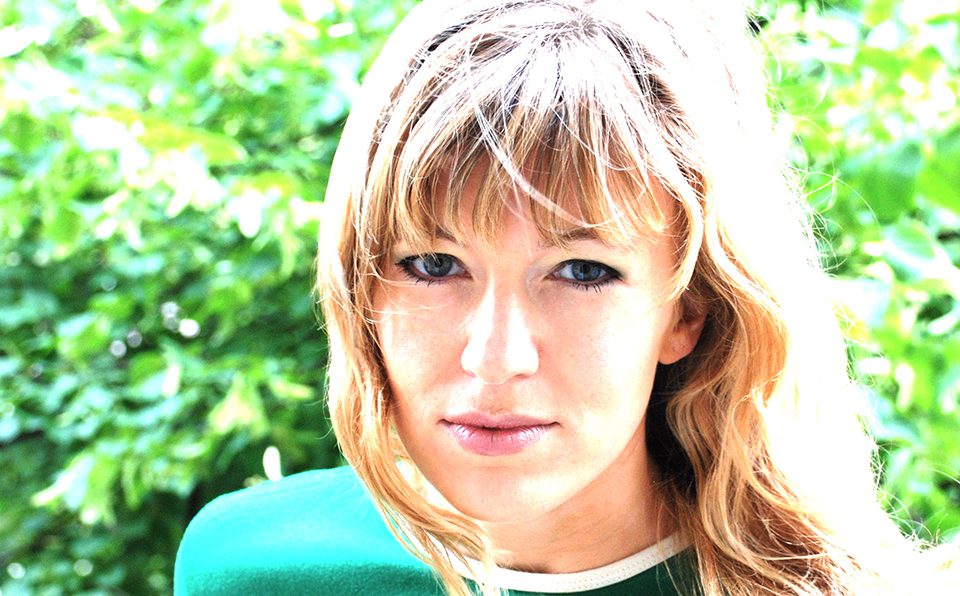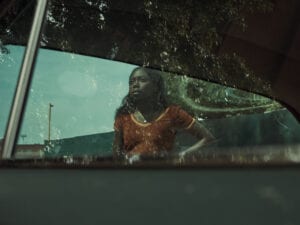Under the Mountain is a fascinating account of family relationships, young love and honesty. With a cast of varied and unexpected characters, Cooke reveals herself to be an intelligent and keen evaluator of individuals and their silent struggle with the outside world.
Sophie Cooke is not a writer; she is an observer of the human condition. With a degree in anthropology, Cooke’s fascination with human behaviour within a community and in isolation saturates her work as a contemporary poet and novelist. The findings from her keen observations of human interaction are presented through her relatable characters and plots. However, it is Cooke’s ability to be both the creator of a fictional world and an impartial evaluator of it, which makes her an important voice for this age.
Cooke’s fascination with the world around her goes beyond casual observation and has always played a significant role in her life. She remarks that even as a child, “my mother said that I was always quiet and very observant. I was always the one sitting in the corner watching all that was going on.” For Cooke, her devotion to the written word grew from this first love of studying people, a study she first sought to record both in poems and surrealist short stories. She states: “I’ve always been fascinated by human beings, and I like writing because I have a real interest in the human condition. Originally I wrote poetry, which is more about the form itself and noticing the tiny details than exploring the human truths you are expressing.” Her decision to make the plunge into “straight fiction” (as she calls it) came from her desire to realistically investigate and analyse the social dynamics and “human truths” working within the family, or community setting.
Cooke’s critically acclaimed first novel, The Glass House, follows a young girl, recently expelled from boarding school, who returns home to her tragically self-destructive mother. Dealing with psychological trauma, complex familial and love relationships, and told in first-person narrative, Cooke details her inspiration: “I wanted to use a narrator who deceives herself about the ugly realities of her life.” This is, of course, in order to explore something human beings struggle with more than anything else—the truth. Whether it is the difficulty of being honest with others or ourselves, Cooke recognises truth as a universally complicated concept that affects even the most nominal facets of our lives. Thoroughly explored in her second novel, Under the Mountain, one particular truth serves to make a major impact in the life of a family.
The nonlinear, third-person narrative of Under the Mountain tells the story of Catherine, a young girl who is laid-up with illness in a top room of her family’s Victorian mansion for nearly the entire summer of 1981. A window that looks down onto the garden below is one of the few pacifying reprieves from her unbearable restlessness as she drifts in and out of sleep. From this window, she witnesses numerous interactions, including clandestine meetings and heated arguments between her parents, sister, cousins, and aunt. Even from this vantage point as the silent observer, Catherine’s knowledge of these household events remains limited since she receives tidbits of information from her sister and cousins at second or third-hand. However, one summer day, after always being the last one to know anything, Catherine becomes the only one who knows the truth when she witnesses a violent act against the beloved family pet. As the only witness, she decides to feign sleep and ignorance rather than implicate the culprit. As a result, an innocent person is blamed, the real villain remains anonymous, and the entire family feel victimised by the event.
With this second novel, Cooke reveals her strong desire to explore abstract themes, particularly the difference between “human truth” and “world truth.” According to her, people’s growing disenchantment with religion has moved them toward a disillusion with objective truth. In a sincere effort to create a global community, human beings have lost the ability to distinguish universally-acknowledged truths. No longer can a truth held by one individual be assumed as certain for any other. Due to this global loss of objective reality, Cooke suggests that truth can (or must) be manufactured between people, a collective action she subtly depicts in the novel; and like all manufactured items, the truth can depreciate. A clarification of this point reveals her interest “in the currency of truth and the way it fluctuates. Truth can become more or less valuable depending when you spend it. Even when you are in possession of the objective facts, truth does not have a fixed exchange rate with accepted reality. It depends on when you speak it, and where, and how. Sometimes it can prove completely worthless, as the young heroine in the novel discovers.”
In addition to assessing the impact one truth has on multiple lives, Cooke also shares her desire to study the varied reaction of each family member to what they feel is an act of terrorism against their way of life. “The attack in Under the Mountain is a terrorist event in miniature; a shocking, seemingly senseless, violent intrusion into the everyday life of the household. It is not ‘terrorist’ in the true sense, because it is not committed in order to engender terror; however, because the household is unaware of the truth, they interpret it as an illogical and terrifying act.” Cooke delicately crafts the characters in Under the Mountain to not only react realistically within their family dynamic, but to symbolically represent the reactions of various social communities and exhibit varying reactions to tragedy. “I wanted to place a ‘world thing’ like a terrorist attack in a domestic setting, to break the whole thing down so that each of the characters represent how a whole society or a whole nation responds differently to an act of violence or terrorism. They all have different responses to it, and, in a way, they stand in for much larger groups of people as a microcosm in the plot.”
In Under the Mountain, Cooke uses the universally relatable setting of a household in order to passively observe and subtly dissect the individual and communal reactions to nonsensical acts of violence. By changing the normal setting of terrorist acts to a domestic sphere, she is able to thoroughly scrutinize the sympathetic, vengeful, resentful, and indifferent sides of affected human beings. With her upcoming appearance at the Kikinda Short Story Festival in Serbia (24-29 July), Cooke continues to explore the human experience by this time diving into Berlin’s surveillance culture in her short story The Long Watch.
The Kikinda Short Story Festival, in its fourth year, celebrates the new works of Eastern European authors while also inviting a number of contemporary authors from the UK to share their writings as well. The Festival brings a diverse community together through the arts, creating a tangible record of the festival’s creativity through a published anthology of the participating writers’ short stories. One of the chief goals of the Festival is to enable an intercultural exchange of creative works between the nations of Eastern and Western Europe. Cooke says that as an author she is proud to be a part of a positive movement for the arts that grew out of the many negative conditions of the post-war Serbian community.
For more information on Sophie Cooke and her new work visit www.myspace.com/sophiecooke and to hear her share her work at the Kikinda Short Story Festival visit kikindashort.blogspot.com.
Jordan Von Cannon





